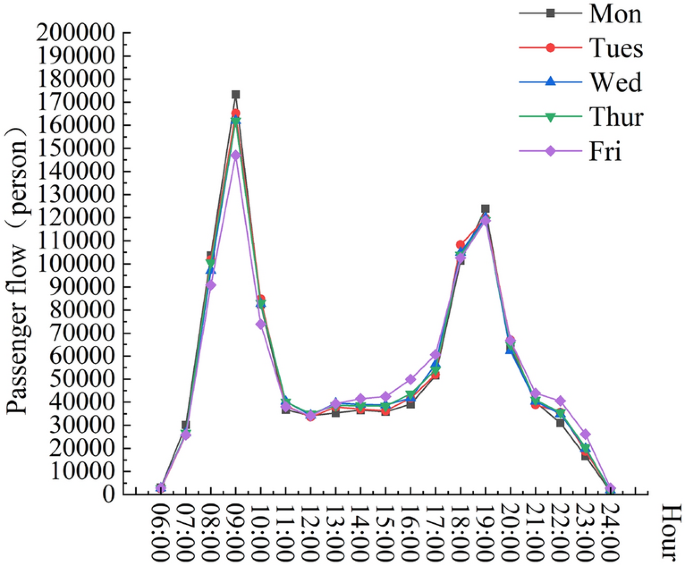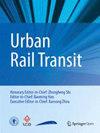城市轨道交通高峰拥堵分时票价折扣策略研究
IF 2.9
4区 工程技术
Q4 TRANSPORTATION
引用次数: 0
摘要
摘要为缓解城市轨道交通高峰时段拥堵,本文提出了一种新的非高峰时段票价折扣策略,以激励乘客将出发时间从高峰时段转移到非高峰时段。首先,对上海地铁乘客进行问卷调查,分析不同票价策略下乘客改变出发时间的意愿。其次,根据调查结果,在考虑公司收入和乘客出行利益的基础上,构建了差别化票价折扣模型,优化目标是实现全天高峰时段和非高峰时段列车负荷均衡。随后,设计了一种嵌套fmincon函数的遗传算法,并结合上海轨道交通9号线的实际数据进行了算法分析。最后,利用实测数据验证了模型的有效性。研究结果表明,淡峰票价优惠策略能够激励6.88%的早高峰和6.66%的晚高峰乘客转向淡峰出行。本研究为城市轨道交通系统实施差异化定价提供理论支持和决策指导。本文章由计算机程序翻译,如有差异,请以英文原文为准。

Research on Time-Based Fare Discount Strategy for Urban Rail Transit Peak Congestion
Abstract To alleviate peak-hour congestion in urban rail transit, this study proposes a new off-peak fare discount strategy to incentivize passengers to shift their departure time from peak to off-peak hours. Firstly, a questionnaire survey of Shanghai metro passengers is conducted to analyze their willingness to change departure time under different fare strategies. Secondly, based on the survey results, a time-differentiated fare discount model is constructed, considering both the company’s revenue and passengers’ travel benefits, and with the optimization objective of achieving balanced peak-hour and off-peak-hour train loads throughout the day. Subsequently, a genetic algorithm with nested fmincon functions is designed and combined with the actual data of Shanghai rail transit line 9 for arithmetic analysis. Finally, the effectiveness of the model is validated using the survey data. The research results show that the off-peak fare discount strategy can incentivize 6.88% of passengers traveling in the morning peak and 6.66% of passengers traveling in the evening peak to shift to off-peak travel. This research provides theoretical support and decision-making guidance for implementing time-differentiated pricing in urban rail transit systems.
求助全文
通过发布文献求助,成功后即可免费获取论文全文。
去求助
来源期刊

Urban Rail Transit
Multiple-
CiteScore
3.10
自引率
6.70%
发文量
20
审稿时长
5 weeks
期刊介绍:
Urban Rail Transit is a peer-reviewed, international, interdisciplinary and open-access journal published under the SpringerOpen brand that provides a platform for scientists, researchers and engineers of urban rail transit to publish their original, significant articles on topics in urban rail transportation operation and management, design and planning, civil engineering, equipment and systems and other related topics to urban rail transit. It is to promote the academic discussions and technical exchanges among peers in the field. The journal also reports important news on the development and operating experience of urban rail transit and related government policies, laws, guidelines, and regulations. It could serve as an important reference for decision¬makers and technologists in urban rail research and construction field.
Specific topics cover:
Column I: Urban Rail Transportation Operation and Management
• urban rail transit flow theory, operation, planning, control and management
• traffic and transport safety
• traffic polices and economics
• urban rail management
• traffic information management
• urban rail scheduling
• train scheduling and management
• strategies of ticket price
• traffic information engineering & control
• intelligent transportation system (ITS) and information technology
• economics, finance, business & industry
• train operation, control
• transport Industries
• transportation engineering
Column II: Urban Rail Transportation Design and Planning
• urban rail planning
• pedestrian studies
• sustainable transport engineering
• rail electrification
• rail signaling and communication
• Intelligent & Automated Transport System Technology ?
• rolling stock design theory and structural reliability
• urban rail transit electrification and automation technologies
• transport Industries
• transportation engineering
Column III: Civil Engineering
• civil engineering technologies
• maintenance of rail infrastructure
• transportation infrastructure systems
• roads, bridges, tunnels, and underground engineering ?
• subgrade and pavement maintenance and performance
Column IV: Equipments and Systems
• mechanical-electronic technologies
• manufacturing engineering
• inspection for trains and rail
• vehicle-track coupling system dynamics, simulation and control
• superconductivity and levitation technology
• magnetic suspension and evacuated tube transport
• railway technology & engineering
• Railway Transport Industries
• transport & vehicle engineering
Column V: other topics of interest
• modern tram
• interdisciplinary transportation research
• environmental impacts such as vibration, noise and pollution
Article types:
• Papers. Reports of original research work.
• Design notes. Brief contributions on current design, development and application work; not normally more than 2500 words (3 journal pages), including descriptions of apparatus or techniques developed for a specific purpose, important experimental or theoretical points and novel technical solutions to commonly encountered problems.
• Rapid communications. Brief, urgent announcements of significant advances or preliminary accounts of new work, not more than 3500 words (4 journal pages). The most important criteria for acceptance of a rapid communication are novel and significant. For these articles authors must state briefly, in a covering letter, exactly why their works merit rapid publication.
• Review articles. These are intended to summarize accepted practice and report on recent progress in selected areas. Such articles are generally commissioned from experts in various field s by the Editorial Board, but others wishing to write a review article may submit an outline for preliminary consideration.
 求助内容:
求助内容: 应助结果提醒方式:
应助结果提醒方式:


